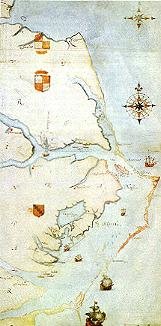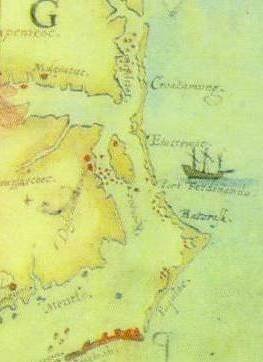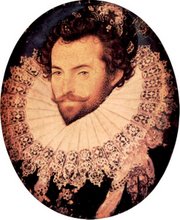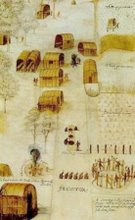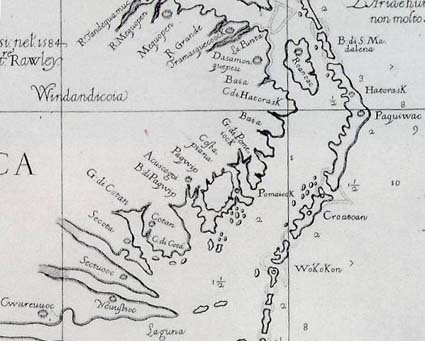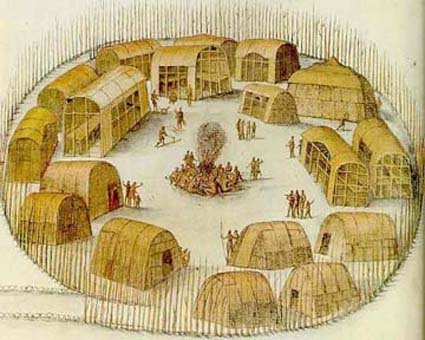In the book, The Colonists, Their Fortune and Probably Fate by David Beers Quinn, he sums thing up ever so succinctly in the introduction. Quoting David here:
"We have clear evidence that white settlers identified as having come from Roanoke were living in the area between the Elizabeth River and what is now Cape Henry in modern Virginia, during the 20 years after their presumed departure from Roanoke Island. We have equally positive evidence that colonists were killed by the Virginia Indian ruler Powhatan shortly before Jamestown was founded. But not all North Carolinians are prepared to accept this evidence because it is indirect and occurs a few years, perhaps only 2 or 3 years, after the event.
Intensive searches - but not intensive enough, we might think - were made for survivors of the colony in 1608, and 7 persons were heard of as having escaped the killing and reached the Chowan tribe not far from the head of Albemarle Sound in North Carolina. Held incommunicado by the Indians there, they were lost sight of and finally forgotten by the Virginia settlers. It can be conjectured with a degree of probability that some of the colonists remained with the Europeanized Indian Manteo on the Carolina Outer Banks near modern Cape Hatteras. All trace of these people was lost, however, and their subsequent fate is totally unknown, through speculation has suggested that they formed an element in later Indian populations on the Carolina sounds.
In assimilating the materials that survive on the Lost Colonists and their fate, there are many gaps in our documentation. These must be filled by working conjectures. Historians, especially of earlier periods of history, have to make assumptions that blend the materials at their disposal into a coherent story while carefully admitting where they are and are not relying directly on documents, which may be good or only imperfect evidence. Otherwise they could not make any sense of their reconstruction of a often poorly documented past. In what follows, assumptions have been made and conjecture proposed that are the best that one historian can do with the materials at his disposal. They do not lead to any dramatic conclusion except that the great majority of the Lost Colonists, after nearly 20 years of life alongside or mingled with the Indians living to the south of Chesapeake Bay, across the border from North Carolina in modern Virginia, were wiped out by a massacre by the despotic ruler of the Indian tribes of tidewater Virginia. Bur our knowledge leads thereafter to strong indications if not proof, that 7 survivors remained in the possession (as slaves?) of a chief who dominated the Chowan River and possibly the lower reaches of the Roanoke River Valley around 1608. There is also a probability that the younger men left on Roanoke Island in 1587 did not rejoin the main body of settlers but lived instead with the Croatoan (Hatteras) Indians of the Outer Banks.
There are bound to be differences of opinion as to what weight should be given each item of direct and indirect evidence. If new solutions are to be found, they must rest either on new documents (the finding of which is unlikely, if not impossible) or, most probably, on archaeological discoveries. If the Lost Colonists lived some 20 years on a site, it is suggested, was well inland near the present Elizabeth River in Virginia, they are bound to have left traces that Powhatan is unlikely to have destroyed completely. Such a discovery would be thrilling for all North Carolinians and Virginians, but there is no assurance that it will ever take place. Nevertheless, it is our best hope of solving what appears to be the crucial element in the mystery of the Lost Colonists and their fate."
David Beers Quinn was an incredible historian and a prolific writer. He penned many books not only about the Lost Colony, but about the historical aspects of England and in a wider perspective, Europe, of that timeframe that influenced the decisions surrounding Sir Walter Raleigh's Lost Colony and other settlement attempts. This timeframe could well be termed the "Voyages of Discovery". Many of David's books were published through the Hakluyt Society in London.
Not everyone agrees with his opinions, but few dispute his documentation. He is the most referenced historian of the modern Lost Colony period. David passed away in 2002 at age 93.
We've spent the past three years sorting through various publications and documents. Some are widely read, such as David Beers Quinn's works, and others are unpublished or original documents. Andy Powell has spent the past year retranslating and transcribing original 1590s documents with some surprises to share in upcoming months. His research, now in book format, is now under consideration by several publishers.
As an organization, I feel it's important to be flexible and to always give ourselves an opportunity to correct our course as new information and opportunities become available. As a result of our ongoing research and new opportunities, we have focused on three primary areas for our upcoming year.
2010 Focus
1. Croatoan (Hatteras Island) - The colonists told us where they went, in the first person. They went to Croatoan. Of course, there is speculation and some evidence, as David said, that they may not have stayed at Croatoan, or perhaps not everyone went to Croatoan. But the best evidence we have directly from the colonist themselves is that they went to Croatoan. John White upon his return trip in 1590 did not doubt that message and was preparing to go there to find the colonists when Mother Nature interfered.
My research focus this year will be on Croatoan, currently Hatteras Island. This is the reason for forming the Hatteras Island DNA projects. If we are going to find the colonists by using DNA evidence, the best place to look is where they told us they were going. Baylus Brooks, who was introduced in the last newsletter, as well as Dawn Taylor with the Hatteras Island Genealogy Society are working with me on this exciting project.
To facilitate this end, I am reconstructing the early families on the island by various forms of documentation. If you descend from one of the Hatteras Island families, please drop me a note and let me include your information in the project.
2. English Records Research - When David Beers Quinn was writing and researching, DNA was just being discovered and the information age was not yet upon us. These two advances together have indeed changed the face of what is possible. We need to find the colonists' families in England. Several individuals have worked around the edges of this challenge over the past few years and have made some significant discoveries. Nelda was able to produce estate records for John Dare from 1594 from her online research. However, English records research is not like American research, and understanding how to systematically research available records and how to obtain access to non-published records is essential. It is too much for anyone to handle as a secondary responsibility. As a companion project to the Hatteras Island project, Nancy Frey has come on board as our English Genealogist and has already begun focusing on doing a thorough records search for each one of the prioritized colonist surnames in England. We will provide that prioritized list later in the newsletter as well as provide a proper introduction for Nancy. I'm extremely glad to have her on board. I'm still amazed that more than 100 people can remain so elusive in English records.
3. Archaeology.....yes indeed....I said archaeology. David was right. Archaeology in combination with other historical, genealogical and DNA research may well be the key to finding the colonists. May I have a drum roll please!!! If you've been following the blog, you already have caught wind of this turn of events. Several of us have been participating in ongoing archaeological projects in which we are attempting to discover the location of the colonists. I can't say more, nor can I say where, but I can share a few photos with you.
Read more here, when the window opens scroll down
This blog is © History Chasers
Click here to view all recent Searching for the Lost Colony DNA Blog posts





